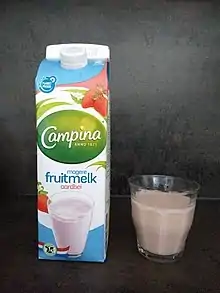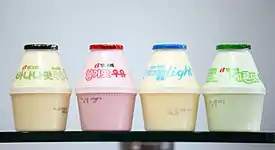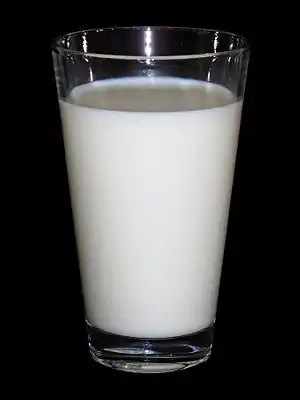Flavored milk
Flavored milk is a sweetened dairy drink made with milk, sugar, flavorings, and sometimes food colorings. It may be sold as a pasteurized, refrigerated product; or as an ultra-high-temperature (UHT) treated product not requiring refrigeration. It may also be made in restaurants or homes by mixing flavorings into milk.

In New England, milk blended with flavored syrups such as chocolate or strawberry in a milkshake machine, is commonly called a "milkshake"; in other parts of the country, a milkshake always includes ice cream or thickeners.
Types

Flavored milk, either cow, soy, almond, or camel, contains sugar, colorings, and (mostly inexpensive artificial) flavorings (one prominent example being the artificial strawberry flavor, ethyl methylphenylglycidate). These flavorings can be sold as a powder to be added to plain milk, or bought pre-mixed alongside other milk products. Flavoring can be included in a straw, and some flavored milk products are designed as dietary supplements by including additional vitamins or minerals.
Bottled spiced (masala) milk is a popular beverage in the Indian subcontinent. Other companies provide flavored beverages in the United Kingdom, which sells packaged beverages to the mobile vendor market. Australia has the highest consumption rate of flavored milk in the world, standing at 9.5 L (2.5 US gal) per capita in 2004.[1]
Over the years, Kemps, a Midwestern milk company, has put various flavors of milk on the market, including their "Monkey Business" milk which is banana flavored.[2] Contrary to popular belief, the milk does not contain any real bananas in it.
Flavored milk is particularly popular in the Australian states of South Australia and Western Australia. A 2013 Sunday Times article reported Western Australia was the "flavoured milk capital of Australia", with a A$220-million industry, average consumption of 19 liters (5.0 U.S. gal) per person, and more than 40 varieties of iced coffee alone available.[3] Similarly, a 2006 Adelaide Advertiser reported South Australia consumed 45,000,000 L (12,000,000 US gal) of flavored milk each year, with 82% of market share held by a single brand, Farmers Union. According to Coca-Cola Amatil, one of the largest bottlers in the Asia-Pacific region, South Australia is the only place where sales of flavored milk outstrip those of cola.[4]
Controversy and criticism
Jamie Oliver, host of Jamie Oliver's Food Revolution, brought attention in the United States to public schools that serve flavored milk in the school cafeterias. Flavored milk advocates claim that many children will avoid the nutrition found in milk unless it has been flavored, with the benefits of milk outweighing a few teaspoons of sugar. Opponents say that with rising levels of obesity and heart disease, flavored milk should be removed from schools and children should be taught to drink plain milk.[5]
A 2018 analysis of more than 90 popular chilled flavoured dairy milks revealed that a carton of flavoured milk can contain as much sugar as a can of soft drink, with many of the bestselling brands containing more than a day’s worth of added sugar in a single serving.[6]
References
- http://www.theage.com.au/articles/2004/02/11/1076388435970.html theage.com.au
- "Banana 1% Low Fat Select Milk (Plastic Half Gallon) - Kemps". Kemps. Archived from the original on 2018-03-17. Retrieved 2018-02-02.
- Sonia Kohlbacher (9 November 2013). "WA in a flavoured milk war" – PerthNow. Accessed 27 January 2015.
- (24 June 2008). "Coke hopes things go better with - milk" – The Advertiser. Accessed 27 January 2015.
- Hoag, Christina (2011-06-15). "Flavored Milk Banned In LA Schools". Huffington Post. Retrieved 2011-06-27.
- Wiedersehn, Sarah. "Warning about high sugar in flavoured milk". The Advertiser. News Corp. Retrieved 9 June 2018.
